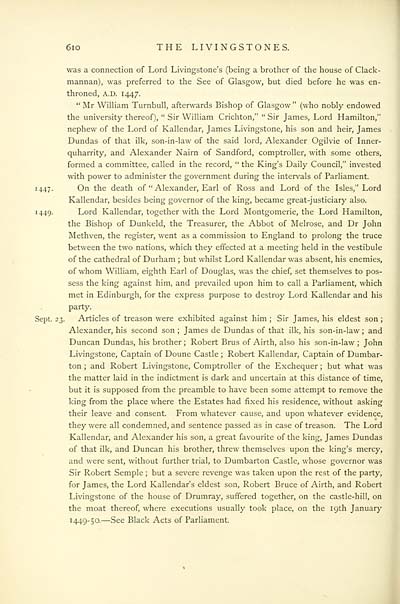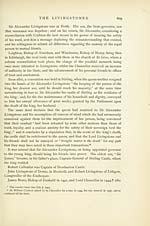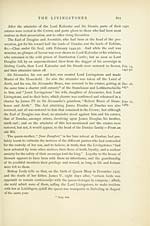Family records of the Bruces and the Cumyns
(630) Page 610
Download files
Complete book:
Individual page:
Thumbnail gallery: Grid view | List view

610 THE LIVINGSTONES.
was a connection of Lord Livingstone's (being a brother of the house of Clack-
mannan), was preferred to the See of Glasgow, but died before he was en-
throned, A.D. 1447.
"Mr William Turnbull, afterwards Bishop of Glasgow" (who nobly endowed
the university thereof), " Sir William Crichton," " Sir James, Lord Hamilton,"
nephew of the Lord of Kallendar, James Livingstone, his son and heir, James
Dundas of that ilk, son-in-law of the said lord, Alexander Ogilvie of Inner-
quharrity, and Alexander Nairn of Sandford, comptroller, with some others,
formed a committee, called in the record, " the King's Daily Council," invested
with power to administer the government during the intervals of Parliament.
1447. On the death of " Alexander, Earl of Ross and Lord of the Isles," Lord
Kallendar, besides being governor of the king, became great-justiciary also.
1449. Lord Kallendar, together with the Lord Montgomerie, the Lord Hamilton,
the Bishop of Dunkeld, the Treasurer, the Abbot of Melrose, and Dr John
Methven, the register, went as a commission to England to prolong the truce
between the two nations, which they effected at a meeting held in the vestibule
of the cathedral of Durham ; but whilst Lord Kallendar was absent, his enemies,
of whom William, eighth Earl of Douglas, was the chief, set themselves to pos-
sess the king against him, and prevailed upon him to call a Parliament, which
met in Edinburgh, for the express purpose to destroy Lord Kallendar and his
party.
Sept. 23. Articles of treason were exhibited against him ; Sir James, his eldest son ;
Alexander, his second son ; James de Dundas of that ilk, his son-in-law ; and
Duncan Dundas, his brother ; Robert Brus of Airth, also his son-in-law ; John
Livingstone, Captain of Doune Castle ; Robert Kallendar, Captain of Dumbar-
ton ; and Robert Livingstone, Comptroller of the Exchequer ; but what was
the matter laid in the indictment is dark and uncertain at this distance of time,
but it is supposed from the preamble to have been some attempt to remove the
king from the place where the Estates had fixed his residence, without asking
their leave and consent. From whatever cause, and upon whatever evidence,
they were all condemned, and sentence passed as in case of treason. The Lord
Kallendar, and Alexander his son, a great favourite of the king, James Dundas
of that ilk, and Duncan his brother, threw themselves upon the king's mercy,
and were sent, without further trial, to Dumbarton Castle, whose governor was
Sir Robert Semple ; but a severe revenge was taken upon the rest of the party,
for James, the Lord Kallendar's eldest son, Robert Bruce of Airth, and Robert
Livingstone of the house of Drumray, suffered together, on the castle-hill, on
the moat thereof, where executions usually took place, on the 19th January
1449-50. — See Black Acts of Parliament.
was a connection of Lord Livingstone's (being a brother of the house of Clack-
mannan), was preferred to the See of Glasgow, but died before he was en-
throned, A.D. 1447.
"Mr William Turnbull, afterwards Bishop of Glasgow" (who nobly endowed
the university thereof), " Sir William Crichton," " Sir James, Lord Hamilton,"
nephew of the Lord of Kallendar, James Livingstone, his son and heir, James
Dundas of that ilk, son-in-law of the said lord, Alexander Ogilvie of Inner-
quharrity, and Alexander Nairn of Sandford, comptroller, with some others,
formed a committee, called in the record, " the King's Daily Council," invested
with power to administer the government during the intervals of Parliament.
1447. On the death of " Alexander, Earl of Ross and Lord of the Isles," Lord
Kallendar, besides being governor of the king, became great-justiciary also.
1449. Lord Kallendar, together with the Lord Montgomerie, the Lord Hamilton,
the Bishop of Dunkeld, the Treasurer, the Abbot of Melrose, and Dr John
Methven, the register, went as a commission to England to prolong the truce
between the two nations, which they effected at a meeting held in the vestibule
of the cathedral of Durham ; but whilst Lord Kallendar was absent, his enemies,
of whom William, eighth Earl of Douglas, was the chief, set themselves to pos-
sess the king against him, and prevailed upon him to call a Parliament, which
met in Edinburgh, for the express purpose to destroy Lord Kallendar and his
party.
Sept. 23. Articles of treason were exhibited against him ; Sir James, his eldest son ;
Alexander, his second son ; James de Dundas of that ilk, his son-in-law ; and
Duncan Dundas, his brother ; Robert Brus of Airth, also his son-in-law ; John
Livingstone, Captain of Doune Castle ; Robert Kallendar, Captain of Dumbar-
ton ; and Robert Livingstone, Comptroller of the Exchequer ; but what was
the matter laid in the indictment is dark and uncertain at this distance of time,
but it is supposed from the preamble to have been some attempt to remove the
king from the place where the Estates had fixed his residence, without asking
their leave and consent. From whatever cause, and upon whatever evidence,
they were all condemned, and sentence passed as in case of treason. The Lord
Kallendar, and Alexander his son, a great favourite of the king, James Dundas
of that ilk, and Duncan his brother, threw themselves upon the king's mercy,
and were sent, without further trial, to Dumbarton Castle, whose governor was
Sir Robert Semple ; but a severe revenge was taken upon the rest of the party,
for James, the Lord Kallendar's eldest son, Robert Bruce of Airth, and Robert
Livingstone of the house of Drumray, suffered together, on the castle-hill, on
the moat thereof, where executions usually took place, on the 19th January
1449-50. — See Black Acts of Parliament.
Set display mode to:
![]() Universal Viewer |
Universal Viewer | ![]() Mirador |
Large image | Transcription
Mirador |
Large image | Transcription
Images and transcriptions on this page, including medium image downloads, may be used under the Creative Commons Attribution 4.0 International Licence unless otherwise stated. ![]()
| Histories of Scottish families > Family records of the Bruces and the Cumyns > (630) Page 610 |
|---|
| Permanent URL | https://digital.nls.uk/95078546 |
|---|
| Description | A selection of almost 400 printed items relating to the history of Scottish families, mostly dating from the 19th and early 20th centuries. Includes memoirs, genealogies and clan histories, with a few produced by emigrant families. The earliest family history goes back to AD 916. |
|---|

